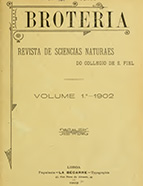

................................
Jesuit Jaime Cortesão and the Freedom of the Indigenous Peoples] by Serafim Leite; As confrarias dos jesuítas em terras de Salsete (Goa) no século XVI-XVII [The Jesuit Confraternities in the Lands of Salsete (Goa) in the 16th-17th Century] by Leopoldo da Rocha; Descoberta de originais do Arquivo de Macau, base da coleção 'Jesuits in Asia’ [Discovery of Originals from the Macau Archives, the Basis of the Jesuits in Asia Collection] by Josef Franz Schütte; A autonomia dos povos guaranis evangelizados pelos jesuítas (1609-1767) (no quinto centenário inaciano 1491-1991) [The Autonomy of the Guarani Peoples Evangelised by the Jesuits (1609-1767): On the Fifth Ignatian Centenary 1491-1991] by Rafael Carbonell de Masy; Os jesuítas portugueses e a Serra Leoa (1605-1617). I - A atividade do P. Baltasar Barreira [The Portuguese Jesuits and Sierra Leone (1605-1617). I - The Activities of Father Baltasar Barreira], by Nuno da Silva Gonçalves;
Os jesuítas no Japão nos séculos XVI e XVII [The Jesuits in Japan in the 16th and 17th centuries] by Estêvão Samagaio, and A acção dos Franciscanos e dos Jesuítas na conquista e povoamento da Amazónia (1617-1662) [The Action of the Franciscans and the Jesuits in the Conquest and Settlement of Amazonia (1617-1662)] by Lucinda Saragoça.
The founding intentions of the journal endowed it with an epistemic breadth that has been preserved and even expanded through its various transformations. Its scope extended beyond religious topics, addressing faith and knowledge in multiple fields, including history, in a manner that was both independent and dialogical. The remarkable longevity of Brotéria in the Portuguese publishing landscape, the wide range of authors it accommodated, and the diversity of historiographical themes it disseminated—evident in the references summarised—highlight its dedication to historiographical production and its dissemination to a broader audience. However, these very qualities make it challenging to categorise Brotéria as a publication with thematic and methodological coherence, given that serving a strictly historiographical purpose was not its primary objective. These characteristics, nonetheless, position Brotéria as both a significant repository of Portuguese historiography from the past century and a reflection of the trends that shaped it. Furthermore, they suggest that the journal itself could serve as a valuable subject for in-depth analysis, offering insights into the evolution and dynamics of historiographical discourse in Portugal.
This work is financed by national funds through FCT - Foundation for Science and Technology, I.P, in the scope of the projects UIDB/04311/2020 and UIDP/04311/2020.
